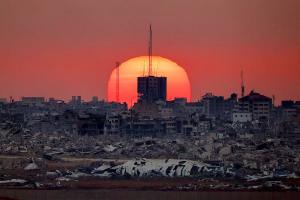Israelis are livid. Their fury is directed not only at Hamas for massacring over 700 people, wounding thousands and abducting at least 130 including women and children, but also at the Israeli government, led by Benjamin Netanyahu, and the Israeli Defense Forces (IDF) for failing to prevent this terrorist invasion.
How did Israeli security forces — among the most sophisticated in the world — not foresee Hamas’s attack? A postmortem is already underway, but what is clear is that Netanyahu’s government was caught napping, distracted by its attempts to force through unpopular judicial reforms. This stole attention away from the worsening security situation in Gaza, the West Bank and the border with Lebanon. Now, Israelis have paid a heavy price.
Netanyahu has, in his many years as prime minster, opted for a policy of containment of Hamas. But while his robust rhetoric has fostered his image as a “security first” leader, his actions have actually strengthened Hamas’s position and undermined the more moderate Palestinian Authority. This outcome was no accident: it was a policy meant to sabotage chances of a peace settlement with the Palestinians, which would have been wildly unpopular with Bibi’s supporters. It will become clearer later whether Israeli intelligence missed vital information, or knew and its warnings were ignored by the government.
The question on everyone’s lips during the first day of the war was: ‘Where is the army?’
Another failure during the early hours of Saturday morning’s attack was the army’s inability to recognize the breach in the security fence between Gaza and Israel, contain the influx of terrorists into Israel and respond swiftly to protect towns near the border. It took forces many hours to arrive at centers of attacks and free civilians. Their ability to counter the attack was hampered by Hamas’s assault on the military base that houses the Gaza Division of the IDF. Other bases in the region were understaffed and unprepared. Urban warfare, especially where civilians are held hostage, is extremely complicated and slow, and the Israelis were on the back foot from the outset.
In the chaos that ensued, civilians who have spent many hours hiding under fire and having to defend themselves, have criticized the army for being absent when it was needed the most. The question on everyone’s lips during the first day of the war was: “Where is the army?”
Haaretz journalist Amir Tibon, who lives in kibbutz Nahal Oz, close to the border with the Gaza Strip, was in hiding with his wife and two young daughters for ten hours. In an indication of the army’s lack of readiness, he was eventually rescued by his father, a retired general, who came to the southern town from his home in the center of Israel.
Bereaved families and relatives of those who are missing and abducted have accused the government of failing to properly communicate with them. At a news conference on Sunday, dozens of angry Israelis, desperate for information on loved ones, demanded information. Into the void left by the government and civil service, ordinary people have stepped up: Israelis have been providing transportation for reservists who had to reach their units and have purchased vital equipment for soldiers, such as ceramic body armor. Civilians also established centers offering emotional support and help for those searching for information, mainly from social media, about the missing. The Israeli community has come together, but the sluggish response from the government will not easily be forgotten.
For now, Netanyahu’s administration is focused on revenge. “The enemy will pay an unprecedented price,” the Israeli leader has vowed. Yet for all this fiery talk, the war’s goals remain unclear. If the IDF is seeking to destroy Hamas, this will be extremely challenging to achieve. Returning hostages is also a delicate business fraught with danger. It will mean deploying ground forces in a prolonged and difficult war. It also means many more Israeli casualties. To achieve this, the government requires the public’s trust, resilience and patience. But that is sorely lacking.
This article was originally published on The Spectator’s UK website.

























